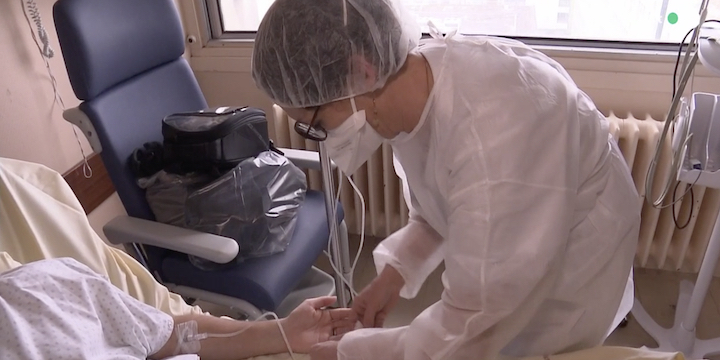The Polycor trial is being carried out in 40 French centers under the coordination of the Nantes University Hospital, and will include 400 patients. “We built a protocol and we were able to show that whatever the dose, low or high, there were no side effects, no allergy, no drug intolerance. And that the highest dose, in a single infusion, made it possible to obtain effective antibodies for 8 to 10 days ” explains Pr Raffi, coordinator of the trial.
These antibodies were developed in another wing of the CHU, by teams from the biotechnology company Xenothera. They have succeeded in reproducing a key player in our immune defenses: polyclonal antibodies.
A promising treatment
“It is an extremely complex set of antibodies that will recognize the aggressor organism in all its aspects and all its sides. So who will be able to attack, for example a virus here, by attacking it from the North, the South, the East, the North-East, the South-West… from all sides of the virus. So even if we lose a small piece of the virus by a mutation, a variant for example, well the polyclonal will continue to attack the virus effectively ” details Odile Duvaux, president of Xenothera.
These antibodies are therefore more promising than their so-called “monoclonal” cousins, popularized by Donald Trump. The first results of this treatment enabled it to obtain the “national priority” label. This facilitates administrative procedures and funding.
A European phase III trial is therefore about to start. And the team is hoping for an authorization for use for patients as early as summer 2021.
 Cherry tomatoes contaminated with salmonella: 92 sick and 1 dead
Cherry tomatoes contaminated with salmonella: 92 sick and 1 dead  A better coaching method can make a person grow
A better coaching method can make a person grow  What is the method to prevent diabetes in children?
What is the method to prevent diabetes in children?  What are the effective factors in causing stomach ulcers?
What are the effective factors in causing stomach ulcers?  Why do embarrassing memories seem to appear at night?
Why do embarrassing memories seem to appear at night?  The amazing link between SARS-CoV-2 infection and newly started diabetes
The amazing link between SARS-CoV-2 infection and newly started diabetes  WHO says monkey pox is not a global emergency right now
WHO says monkey pox is not a global emergency right now  Single cell RNA sequencing uncovers new mechanisms of heart disease
Single cell RNA sequencing uncovers new mechanisms of heart disease  Hepatitis of unknown origin: 3 new deaths and 228 cases worldwide
Hepatitis of unknown origin: 3 new deaths and 228 cases worldwide 